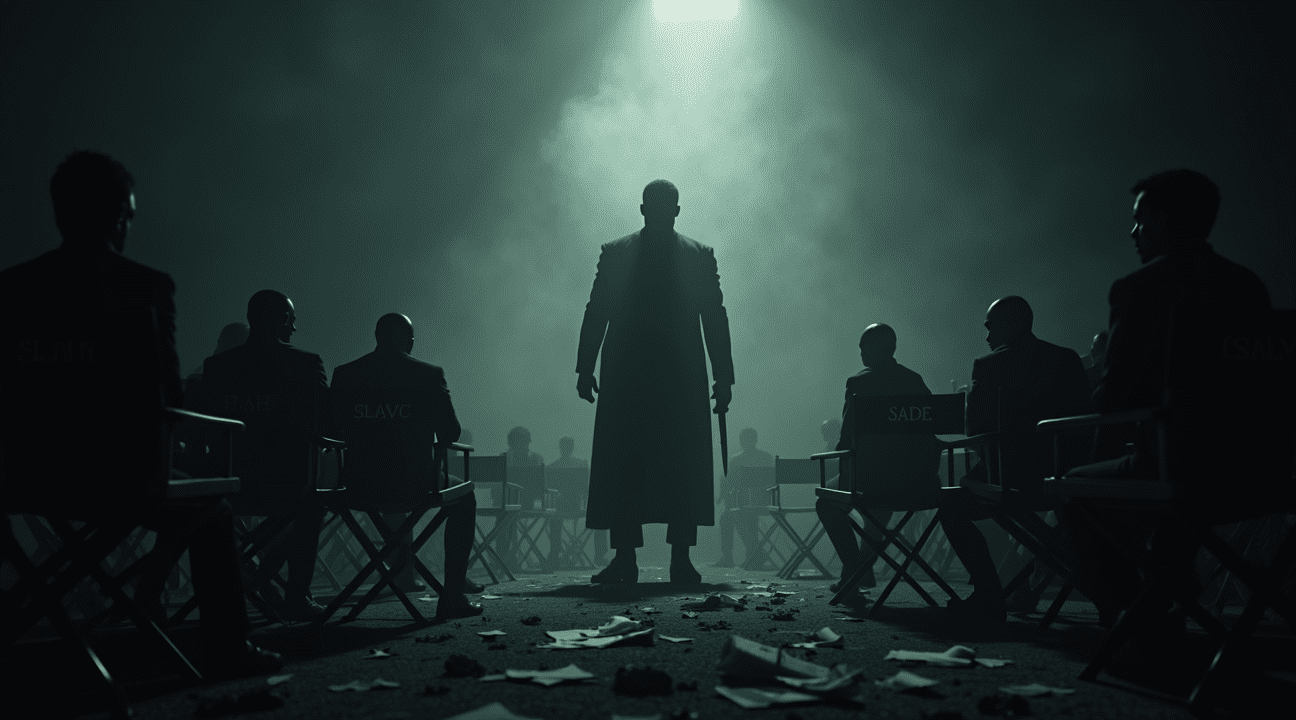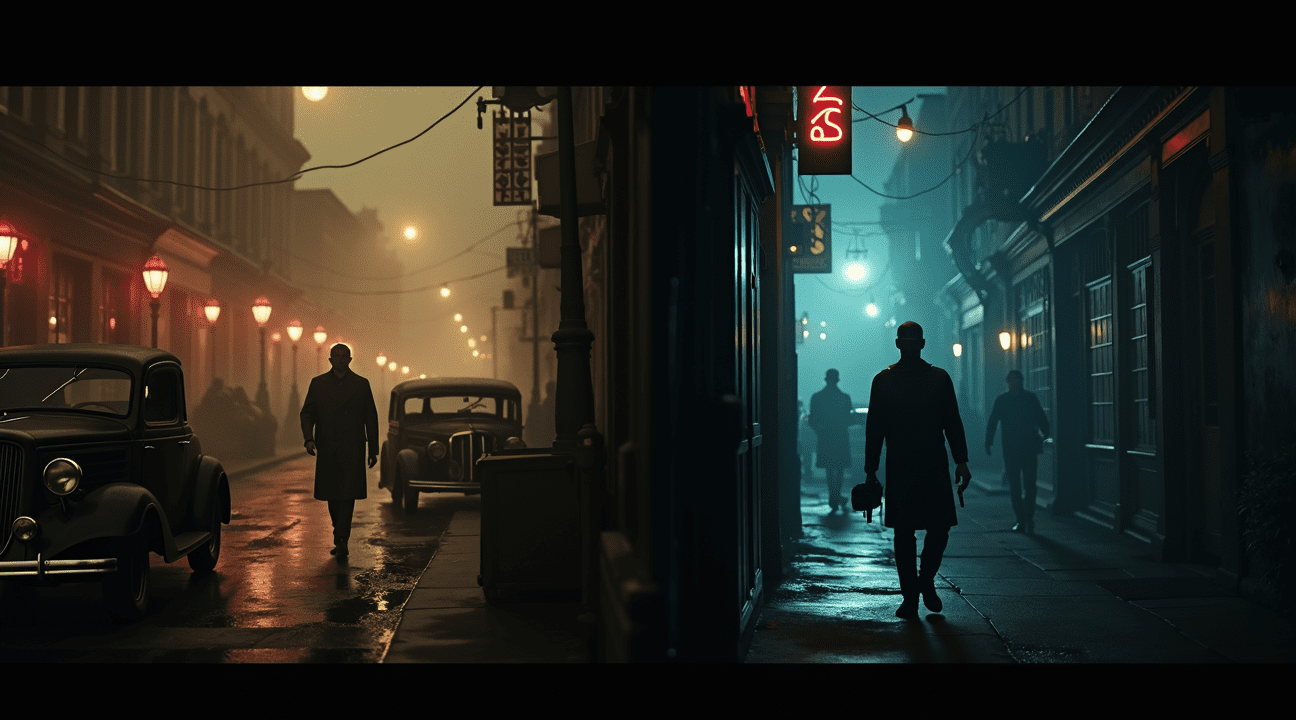Disney officially pulled the Blade reboot from its 2025 release schedule in November 2024, marking the peak of years of development troubles that have haunted the project since its 2019 Comic-Con announcement.
The highly anticipated return of Marvel’s vampire slayer, portrayed by Academy Award-winner Mahershala Ali, has struggled through an arduous development cycle. From multiple creative team changes to evolving story concepts, Blade’s journey from announcement to execution has been filled with stops and starts, culminating in its removal from Disney’s upcoming slate.
Key Takeaways
- Complete removal from schedule: Disney extracted Blade from its 2025 release calendar after multiple delays pushed the film from its original 2023 date through ongoing production setbacks.
- Extensive creative turnover: The project has shed two directors—Bassam Tariq and Yann Demange—and several cast members including Aaron Pierre and Delroy Lindo, with no replacements currently attached.
- Major script changes: Marvel abandoned earlier period setting concepts, including a Prohibition Era approach, in favor of a modern-day storyline, requiring complete creative overhauls.
- Quality over quantity approach: Kevin Feige explained that Marvel’s commitment to delivering a high-quality film rather than rushing production has contributed to the extended delays.
- Development limbo status: The film currently has no official production timeline or confirmed creative team, though Marvel maintains its commitment to the character and to Mahershala Ali’s involvement.
At the moment, the Blade reboot remains one of the most uncertain ventures in Marvel’s cinematic future. However, both fans and filmmakers appear willing to wait in hopes that the final product will live up to its potential.
Marvel Removes Blade From Release Schedule After Years of Setbacks
Disney officially pulled the Blade reboot from its 2025 release calendar in November 2024, marking a significant blow to fans who’ve waited years for the vampire hunter’s return. The removal represents the culmination of extensive development struggles that have plagued the project since its initial announcement.
A Timeline of Delays and Production Issues
The Blade reboot originally held a November 3, 2023 release date, but production issues quickly derailed those plans. Director changes became a recurring theme, with multiple filmmakers departing the project due to creative differences and script concerns. Script rewrites have consumed considerable time and resources, as Marvel struggled to craft a story that satisfied both studio executives and the character’s legacy.
Industry strikes further complicated matters, with the Writers Guild strike bringing development to a standstill. Each setback pushed the release date further back, from 2023 to 2024, then to 2025, before Disney ultimately decided to remove it entirely from their official schedule.
Current Status and Future Possibilities
The film now exists in what industry insiders call development hell—a limbo where projects stall indefinitely without clear resolution. No official production start date exists, and Marvel hasn’t announced when development might resume. This uncertainty leaves Mahershala Ali, who was cast as the titular vampire hunter, in an awkward position as his attachment to the role remains unclear.
Interestingly, Marvel has added three untitled MCU projects to their 2028 slate, which could potentially serve as placeholders for Blade if the studio resolves its development issues. These mysterious projects suggest Marvel hasn’t completely abandoned the character, though they’re clearly taking a more cautious approach.
The removal from Disney’s release schedule doesn’t necessarily mean cancellation, but it does indicate that significant problems remain unresolved. Previous attempts to move forward have consistently failed, suggesting deeper structural issues with the project beyond typical production challenges.
Gaming enthusiasts might find some consolation in rumors about a Blade game potentially in development, though these remain unconfirmed. Marvel has also been working on finding a director for the Blade movie project, though recent developments suggest this search has become even more critical.
The current situation leaves fans without any concrete timeline for when they might see Blade return to screens. While Marvel hasn’t officially canceled the project, the complete removal from their release schedule signals that substantial work remains before the vampire hunter can make his MCU debut.
Two Directors and Multiple Cast Members Have Departed the Troubled Production
The Blade reboot has experienced a revolving door of creative talent, losing two directors in succession and facing significant casting upheaval. Bassam Tariq was initially attached to helm the project before departing, followed by Yann Demange, who also exited the production. As of July 2025, no director remains attached to guide this troubled vampire hunter film.
Casting changes have been equally dramatic, with several key actors departing after their initial announcements. Aaron Pierre and Delroy Lindo were both cast in supporting roles but have since left the project. Lindo offered insight into the production’s struggles, initially describing early plans as “very inclusive and exciting” before later stating bluntly that “it just went off the rails.” His comments provide a rare glimpse into the internal chaos that has plagued the film’s development.
Current Cast Status Remains Uncertain
The departure of established actors has left the supporting cast in flux. Mia Goth reportedly remains attached to the project, though her involvement faces uncertainty due to her commitment to an upcoming Star Wars project. Other originally announced cast members have also exited without replacements being named, creating additional gaps in the film’s roster.
Despite the widespread departures, Mahershala Ali has remained steadfast in his commitment to the titular role. Ali has publicly expressed his readiness to begin work once the project resumes proper development, providing stability amid the production chaos. His continued involvement offers hope for fans who have waited years for the vampire hunter’s return to theaters.
The pattern of departures suggests deeper structural issues within the production beyond typical creative differences. Marvel’s struggles to find a director for this particular project stand in stark contrast to their typically smooth development process for other superhero films. Industry observers note that the combination of director and cast departures indicates significant creative disagreements or studio interference.
Gaming enthusiasts have watched these developments closely, especially given rumors about other Blade content in development. Recent speculation about potential video game adaptations has gained traction as fans seek alternative ways to experience the character while the film remains in limbo.
The production’s troubles highlight the challenges of reviving beloved characters after extended absences. With Ali’s continued commitment serving as the sole constant, Marvel faces the challenge of rebuilding both the creative team and supporting cast from scratch while maintaining fan confidence in the project’s eventual completion.

Kevin Feige Explains Marvel’s Quality Over Quantity Shift Behind the Delays
Marvel Studios President Kevin Feige recently addressed the extended delays plaguing the Blade movie project, revealing that the studio’s own over-expansion created significant challenges. I found his candid admission particularly telling when he acknowledged that Marvel’s rapid release schedule had stretched resources thin across multiple productions. The studio recognized this issue and made a conscious decision to prioritize quality over quantity, even if it meant disappointing fans with continued postponements.
Mahershala Ali Deserves Better
Feige’s comments about protecting Mahershala Ali from a subpar project demonstrate Marvel’s commitment to their star actor. He explicitly stated, “We didn’t want to do that to Mahershala,” referring to rushing the vampire hunter into production without proper development. This protective stance shows how much the studio values Ali’s portrayal and reputation within the industry.
The Marvel executive firmly rejected taking the easy route by simply recreating the classic Blade formula. Rather than “putting a leather outfit on him and having him start killing vampires,” Feige emphasized the need for a unique approach that would distinguish this iteration from Wesley Snipes’ beloved trilogy. This creative challenge has proven more complex than initially anticipated, contributing to the project’s extended development timeline.
MCU Integration Challenges
Creating a fresh take on Blade while ensuring seamless MCU integration has presented unexpected difficulties for Marvel’s creative team. I understand that the studio wants to avoid rehashing familiar vampire-hunting tropes while maintaining the character’s core appeal. This balancing act requires careful consideration of how Blade fits into the broader Marvel narrative without feeling forced or disconnected.
Feige reiterated Marvel’s unwavering commitment to the character despite these setbacks. The studio continues working on finding the right creative direction that honors both Ali’s talents and the character’s legacy. While fans express frustration with repeated delays, Feige’s transparency about the development process suggests Marvel would rather deliver an exceptional film than rush a mediocre one to market.
The studio’s shift toward fewer, higher-quality releases reflects lessons learned from recent mixed reception to some Marvel projects. By taking additional time to perfect Blade’s story and tone, Marvel aims to restore confidence in their creative decision-making. This approach, though testing fan patience, could ultimately result in a stronger addition to the Marvel Cinematic Universe that satisfies both longtime Blade enthusiasts and newcomers to the franchise.
Complete Script Overhaul Abandons Period Setting for Modern Day Approach
The Blade reboot has undergone dramatic creative shifts, with earlier script versions featuring historical settings like the Prohibition Era now completely abandoned. I’ve observed how these foundational changes reflect the project’s ongoing struggle to find its creative direction.
From Prohibition to Present Day
Initial drafts explored a period setting that would have transported audiences to the 1920s and 1930s, capitalizing on the atmospheric potential of the Prohibition Era. This historical approach promised a unique aesthetic that could have distinguished the film from contemporary superhero offerings. However, Marvel ultimately decided to pivot toward a modern-day setting, forcing a complete reimagining of the project’s core elements.
Eric Pearson, the screenwriter behind Marvel’s Fantastic Four and Thunderbolts, now leads the script development with an entirely fresh approach. His involvement marks a significant departure from previous iterations, suggesting Marvel wants to establish a completely different tone and narrative structure. This represents the latest in a series of creative overhauls that have plagued the production.
Creative Casualties and Resource Reallocation
The script changes have created ripple effects throughout the production team. Oscar-winning costume designer Ruth E. Carter had already invested considerable effort developing period-appropriate costumes for the earlier historical versions. Her work, originally crafted to capture the essence of the Prohibition Era, has since been repurposed for other Marvel projects rather than being discarded entirely.
This resource reallocation highlights the financial and creative costs of the film’s repeated direction changes. Carter’s contributions, while no longer suitable for the modern setting, demonstrate the level of investment that was made in the period concept before its abandonment. The decision to shift from a historical to contemporary approach fundamentally altered every aspect of production design.
The tone changes have been equally dramatic, with each iteration bringing different creative visions to the table. Marvel’s willingness to completely restart the scripting process suggests deep uncertainty about how to position Blade within their current cinematic landscape. While there have been rumors of a Blade game in development, the film continues to face these fundamental creative challenges.
These script rewrites and setting changes reflect broader questions about the character’s place in modern superhero storytelling, with Marvel apparently struggling to balance the character’s darker elements with their established formula.

Blade Announced at Comic-Con 2019 with High MCU Expectations
Marvel Studios dropped a bombshell at San Diego Comic-Con in 2019 when Kevin Feige officially announced that Blade would join the Marvel Cinematic Universe. The reveal sent shockwaves through Hall H as fans erupted in celebration, knowing their beloved vampire hunter would finally get his due within the interconnected Marvel framework.
Mahershala Ali Takes the Mantle
The casting of Mahershala Ali as Eric Brooks immediately elevated expectations for the Blade reboot. Ali’s Academy Award-winning performances in “Moonlight” and “Green Book” brought serious dramatic credibility to the project. His surprise appearance at Comic-Con, wearing Blade’s signature sunglasses, created an iconic moment that fans still reference today. Marvel clearly viewed this casting as a major coup, positioning Ali as the face of their expanding supernatural roster.
MCU’s Supernatural Ambitions
Marvel Studios positioned the Blade reboot as a foundational piece in their supernatural universe expansion. The announcement came during Phase Four planning, when Marvel was actively diversifying its content beyond traditional superhero fare. Studio executives expressed confidence that Blade would serve as an entry point for horror elements within the MCU, similar to how “Guardians of the Galaxy” opened doors for cosmic storytelling.
The project represented Marvel’s commitment to exploring darker themes while maintaining their signature style. Industry insiders noted that the studio saw Blade’s potential across multiple media platforms, including potential video game adaptations that could expand the character’s reach.
Marvel’s enthusiasm for the project was palpable during those early announcements. Studio heads spoke about Blade with the same confidence they’d shown for previous MCU successes. The character’s rich comic book history and Wesley Snipes’ memorable film trilogy provided a solid foundation for reimagining the vampire hunter for modern audiences.
The stark contrast between that initial confidence and today’s uncertainty highlights how dramatically the project’s trajectory has shifted. What began as a celebrated addition to Marvel’s roster has become one of their most troubled productions. The journey from that triumphant Comic-Con moment to the current development struggles illustrates the unpredictable nature of film production, even for a studio as successful as Marvel.
That 2019 announcement marked a pivotal moment when everything seemed possible for Blade’s MCU future. Marvel’s subsequent search for the right director would prove more challenging than anyone anticipated at that exciting Comic-Con reveal.
Project Remains in Development Hell with Uncertain Future Timeline
Marvel Studios finds itself in an unprecedented situation with the Blade reboot, which has become one of the most troubled productions in MCU history. The project currently exists in development hell, with no clear timeline for completion despite multiple attempts to move forward.
The studio has openly acknowledged that Blade lacks any definitive schedule, marking a significant departure from Marvel’s typically structured approach to film releases. This admission represents a rare instance where Marvel has publicly stepped back from its usual confidence in project timelines. Studio executives continue to express their commitment to the character and Mahershala Ali‘s portrayal, but concrete progress remains elusive.
Multiple creative personnel changes have plagued the production since its announcement. Directors, writers, and other key positions have experienced significant turnover, creating an unstable foundation for the project’s development. Each change has resulted in script revisions, creative direction shifts, and further delays that push any potential release date into an increasingly uncertain future.
Marvel’s Strategic Shift Influences Production Approach
The extended delays reflect Marvel’s evolving strategy that prioritizes strong creative foundations over adhering to predetermined release schedules. This approach represents a significant shift from the studio’s previous model of locking in dates and working backward from those commitments. Marvel executives have indicated they’d rather ensure the right creative team and script are in place before moving forward with production.
Several factors contribute to the project’s current status:
- Script development challenges that have required multiple rewrites and creative overhauls
- Difficulty finding the right directorial vision that aligns with both Marvel’s standards and Ali’s expectations
- Complex character integration problems within the broader MCU framework
- Budget and resource allocation questions given the project’s extended development period
Currently, no official production date exists on Marvel’s schedule, and industry insiders suggest the project remains in early development phases. The studio has removed any pressure to rush the production, instead focusing on solving the creative challenges that have prevented progress.
Ali remains attached to the project despite the lengthy delays and uncertainty. His continued involvement signals both his personal investment in the character and Marvel’s determination to eventually deliver the film. However, even with Ali’s commitment, the lack of a supporting creative infrastructure continues to present obstacles.
The situation has drawn comparisons to other high-profile projects that have struggled through extended development periods. Unlike typical production delays that involve scheduling conflicts or technical issues, Blade’s problems stem from fundamental creative disagreements and vision alignment challenges.
Marvel’s handling of the Blade situation demonstrates the studio’s willingness to absorb short-term scheduling disruptions to maintain long-term quality standards. This approach differs markedly from their earlier phases, where release dates often drove creative decisions rather than the reverse.
Industry speculation suggests that Marvel’s director search remains active, though no concrete developments have emerged. The studio appears committed to finding the right creative match rather than settling for available options.
The troubled production status has also sparked discussions about whether other Blade projects might fill the gap while the film remains in development limbo. These alternative approaches could maintain character visibility while the primary film project works through its challenges.
Despite the uncertainty, Marvel executives maintain that Blade will eventually move forward when the right elements align. This commitment suggests the project hasn’t been abandoned, but rather placed in an extended development phase until suitable solutions emerge.
The extended timeline has created an unusual situation where a major MCU character announcement has resulted in years of development without tangible progress. This scenario highlights the complex challenges involved in translating certain characters and concepts into the established MCU framework while meeting both studio and talent expectations for quality and creative vision.
Sources:
WDWNT – Marvel President Kevin Feige Confirms Blade Reboot Still Happening, Will Be Set in Modern Day
SuperHeroHype – Blade Movie Cast: Who Has Left? Mahershala Ali Still Attached
GamesRadar – Blade Gets the Most Promising Update in Ages as Marvel Boss Kevin Feige Reveals New Setting and Explains Delays: “We Didn’t Want to Simply Just Put a Leather Outfit on Him”
Backstage – Everything We Know About Marvel’s Blade Reboot
JoBlo – Kevin Feige Confirms Mahershala Ali is Still Attached to the MCU Blade Reboot, Which Will Be Set in Modern Day
Screen Rant – Blade Movie Actor Delroy Lindo: “Off Rails”
Fangoria – Blade Reboot Still in Development, Says Marvel’s Kevin Feige
Collider – Blade Movie Crew Explains Reboot Problems


